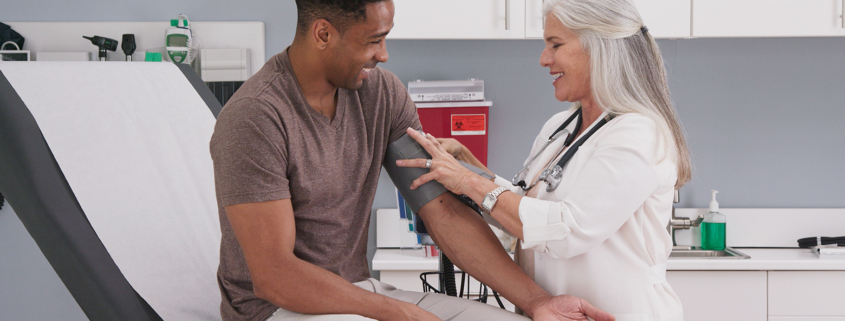Family Physicians and Your Health
Family physicians, also called primary care physicians and family doctors, are the first line of defense in our healthcare system. Their role covers a wide range of duties: they provide regular checkups, monitor chronic conditions, and inform patients when they need to see a specialist.
A family physician may operate in a private practice or a family practice with other family medicine physicians and typically sees all members of a family – children and adults.
Family Physician Training
In order to become a family physician, students must first graduate with a degree in pre-medicine and then attend medical school. Medical students can attend either a traditional medical school (and become a doctor of internal medicine) or complete schooling in an osteopathic medical school (and become a doctor of osteopathic medicine) after passing the required exams.
After successfully passing exams, newly graduated doctors then complete their residency, which lasts three to four years. No matter their chosen area of medical specialty, rotations are also required in areas like emergency medicine, general surgery, obstetrics, and pediatrics.
Once residency is completed, doctors then receive certification, either through the American Board of Family Medicine or the American Osteopathic Board of Family Physicians. After that, all that’s left is the licensing process in the state where the doctor will be practicing!
A Family Physician is Your Personal Health Care Guide
A family physician can treat a broad range of physical and mental health issues. They are trained to identify and treat a wide range of symptoms, including those affecting the heart, lungs, brain, muscles and bones.
According to the American Academy of Family Physicians, promoting positive health habits that prevent disease is foundational to family medicine, which is why family physicians also provide health education and counseling to help facilitate healthy lifestyle choices.
Family physicians are trained to provide a wide range of care for patients of all ages. For children and adults, this includes routine health examinations and preventive screenings. Family physicians can also treat patients with a wide range of health conditions, from diabetes and depression to heart disease.
Some family physicians also have special training for treating children and young adults, while others have expertise caring for older adults with complex medical issues (or chronic illnesses), such as those needing regular dialysis treatments. Some family physicians even attend births as obstetricians.
Disease Prevention
Family physician offices pride themselves on providing education and counseling on lifestyle changes that promote health and prevent disease. In fact, preventive care is a key component of their work, which is why family physicians may administer vaccinations or provide counseling about diet, exercise and other lifestyle issues that keep patients healthy.
Family doctors have a specialized understanding of healthcare for all family members, from newborns to seniors. Because your doctor knows you and your medical history, he or she will be able to give you more personalized medical advice during a checkup than a general practitioner might be able to do.
Family Physicians Provide Checkups, Immunizations and Screening Tests
Preventive check ups that identify health risks are key to a good relationship with your doctor. Family medicine practices conduct a variety of appointments to help patients maintain optimal health and wellness:
- Immunizations and vaccines to prevent illness
- Health screenings to identify health problems before they become more serious
- Regular visits when you have health concerns or questions
If a family physician comes across a patient with a disorder that needs treatment by a specialist, the physician will coordinate the process of helping that patient find the best care, even if it means referring them to another doctor. The family physician will also follow-up on how well the referral worked out and make sure it is appropriate.
For example, patients may be referred to an orthopedic surgeon or an endocrinologist, if needed, but the family physician will remain the point person to make sure all aspects are coordinated and that you receive the best possible care.
Establishing Treatment
Once a diagnosis has been established, the doctor will create a treatment plan using their knowledge of your medical history and diagnosis. If you’re experiencing acute symptoms (like a fever, cough or rash), the family physician will treat those immediately but then also look for any underlying causes.
Family physicians may prescribe medications to treat your condition, which can include antibiotics for an infection or medications that lower blood pressure. They also use lifestyle changes as treatments, like helping patients quit smoking or lose weight. They may refer you to other specialists, if needed, for more specialized care. Family physicians are also trained to screen for health problems and can offer advice on how to stay healthy in general. This can include lifestyle counseling (for example, smoking cessation) or screening tests like mammograms and colonoscopies.
Medical Care In An Emergency
Family physicians are trained to handle a wide range of urgent medical problems. In fact, many family medicine doctors practice in outpatient urgent care facilities. Below are some of the things that family physicians can do in an emergency (but remember, when in distress and in need of immediate assistance, it’s always best to immediately contact 911).
- Call 911 on their patients behalf and have paramedics come to their aid, or arrange transportation to an inpatient facility
- Recognize when a patient is experiencing a heart attack or stroke and act accordingly
- Know when they need to take their patient to the hospital versus when they can be treated at home, saving time and money
- Be able to treat allergic reactions
Comprehensive Health Care
Family physicians, as compared to internists, are trained to provide comprehensive, continuing care to people of all ages, from infancy to adulthood. Unlike specialists who focus on specific areas of medicine (e.g., surgery, oncology), a family physician offers a broad range of services that cover all ages and both genders.
When you’re in need of a trusted primary care provider, reach out to Meridian HealthCare. With our experience in geriatrics and women’s health, your family’s health is our top priority. Contact Meridian HealthCare to set up your next appointment today!






